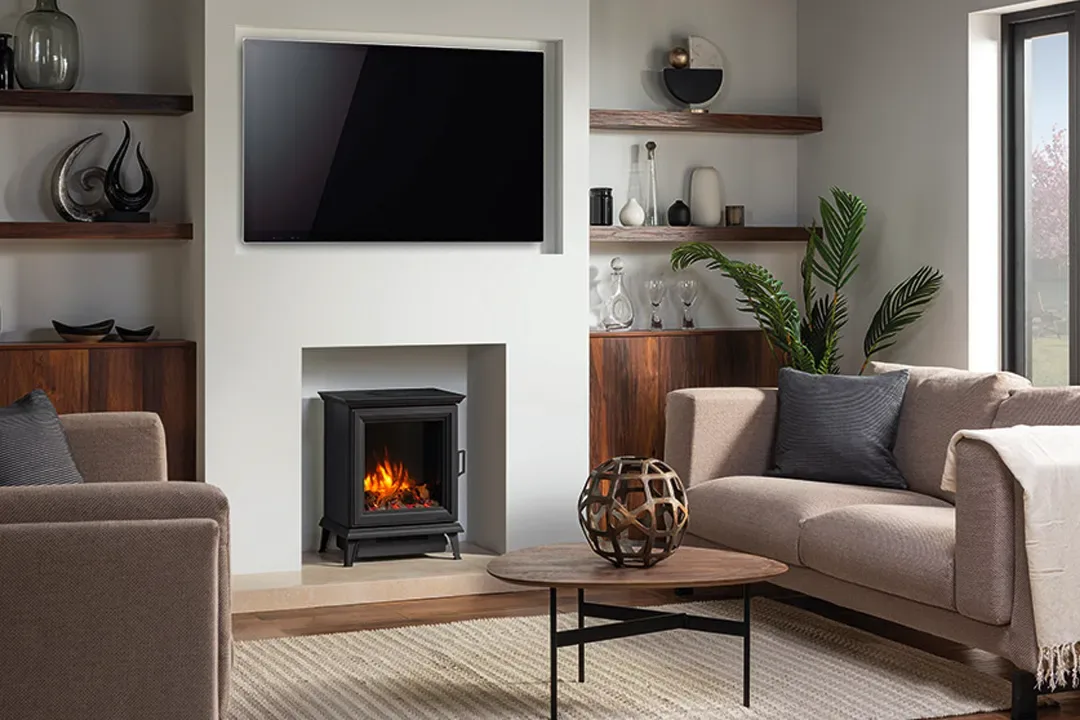How much does it cost to run an electric fire for an hour?
When looking for warmth and comfort in your home, especially during the colder months, electric fires and stoves present a popular choice, offering 100% efficiency at an affordable price and delivering aesthetic appeal to living spaces of all styles.
There are multiple factors that affect the cost of heating your home, not only the energy input of the electric fire you install, but also how well your home is insulated and retains its heat.
In this article, we delve into the specifics of the Gazco Sheraton 5 Electric Stove, an efficient electric fire with an output ranging from 0.75kW to 1.5kW, and analyse its cost-effectiveness in heating your home.

How to calculate the cost of running an electric fire for an hour
First, it's essential to understand the terms 'input' and 'output' when discussing electric fires. The 'input' refers to the volume of electricity the fire consumes to generate heat, measured in kilowatts (kW).
The 'output' is the heat the fire produces and delivers in a room, measured in kW. Our example electric fire has an output of .75kW in its low setting, going up to 1.5kW in high. The difference between these two figures indicates the efficiency of the electric fire; the higher the output relative to the input, the more efficient the fire.
At the point of use, electric fires are 100% efficient – every watt of power they use is turned into usable heat for your home, which means nothing is wasted. This is in contrast to gas fires and stoves, where some energy escapes at the point of combustion.
To calculate the cost of running an electric fire, we need to consider the current electricity prices, which can vary significantly depending on the region and the provider.
As of April 2024, electric prices are 24.5p per kWh (OFGEM, Energy Price Cap) – a figure you can adjust according to your local or national rates.
We can calculate the cost of running our electric fire for one hour and an evening using these figures and multiplying the input by the price per kWh.
- input x cost per kWh = cost per hour
- 19p for 1 hour on low heat, or 74p for 4 hours
0.75kW (low) x 24.5p (cost per kWh) = 18.37p per hour
- 37p for 1 hour on high heat, or £1.48 for 4 hours
1.5kW (high) x 24.5p (cost per kWh) = 36.75p per hour

What effects the cost of heating your home with a fire?
When considering the cost of heating your home, the size of space and the desired temperatures are crucial factors. Larger spaces and higher temperatures will require more electricity to warm, and so will increase your overall cost.
Additionally, insulation quality will significantly impact the efficiency of heating your home, with better-insulated homes retaining heat more effectively, reducing the need for continuous heating.
Conclusion
In conclusion, an electric stove with a 0.75kW input/output offers an efficient and cost-effective heating solution for individual rooms.
The cost of running such an electric fire is relatively low, at approximately 18p per hour based on an electricity price of 24.5p per kWh. However, the overall cost-effectiveness depends on various factors, including the size and insulation quality of the home, as well as the local electricity prices.
Homeowners should consider these factors carefully to determine whether an electric fire or stove meets their heating needs and budget.
SOURCES
Figures in this article are based on the Gazco Sheraton 5 Electric Stove, running at 4 hours on low heat setting of 0.75kW, with flame effects for the full duration.
Energy costs are based on the average UK cost per unit of electricity (including VAT) as of the 1st April 2024 at 24.5p per kWh – OFGEM, Energy Price Cap – https://www.ofgem.gov.uk/energy-price-cap.
Figures are rounded to two decimal places and are based on the England, Scotland and Wales average for people who pay by Direct Debit, and do not include any costs relating to product maintenance and servicing.